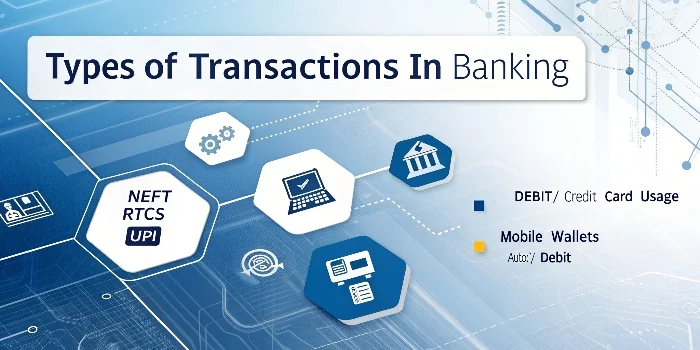20-22 Wenlock Road, LONDON, N1 7GU
20-22 Wenlock Road, LONDON, N1 7GU

Banking transactions have become an essential part of everyday life in the UK. Whether you’re transferring money to a friend, paying a utility bill, or withdrawing cash from an ATM, each action falls under specific types of banking transactions.
Understanding these banking transaction types in the UK helps you manage your finances better and choose the right method for your needs. This comprehensive guide will walk you through all the major types of transactions in banking, both traditional and digital.
A banking transaction is any activity that involves the movement of money in or out of a bank account. These can be physical, like cash deposits or cheques, or digital, like Faster Payments or mobile wallet payments. Every financial action through your bank falls under this category.
Here’s a detailed look at the most common types of transactions in UK banking, with real-life examples and use cases:
One of the oldest and most basic forms, cash transactions involve physical money at a bank or ATM.
Why it matters:
Cash is useful for small purchases, but lacks the traceability and security of digital methods.
Cheques are formal instruments used to instruct a bank to pay a specific amount to someone.
Why it matters:
Cheques are useful for business dealings and large payments, offering a paper trail and legal backing.
Digital banking methods are fast, secure, and available 24/7. UK banking supports several transfer types:
Why it matters:
Online transfers offer speed, security, and convenience — ideal for both personal and business use.
Card payments are widely used for both online and in-person spending.
Why it matters:
Cards are quick and globally accepted. Responsible use of credit cards helps build your credit profile.
A bankers’ draft is a prepaid instrument issued by a bank to securely transfer money.
Why it matters:
Safer than cheques and trusted for official payments or real estate transactions.
These automate recurring banking transactions and are commonly used in the UK:
Why it matters:
These options ensure bills are paid on time and reduce the risk of missing due dates.
Mobile wallets store your card or bank details on your smartphone for contactless payments.
Why it matters:
They offer secure, fast, and convenient payments without the need for physical cards.
These involve exchanging currency or making international payments.
Why it matters:
Vital for international trade, study, travel, and remote work. Regulated for compliance and transparency.
Understanding the types of transactions in banking UK helps you choose the right methods to manage your finances effectively. From traditional cash and cheque payments to advanced online transfers and mobile wallets, each transaction type serves a distinct purpose.
Whether you’re handling personal budgeting or business accounts, mastering these banking transaction types will improve your financial planning, security, and efficiency. In today’s digital world, staying informed about how your money moves is not optional — it’s essential.
The main types of transactions in banks include cash transactions, cheque payments, online transfers (NEFT, RTGS, IMPS, UPI), card payments, demand drafts, auto-debits, and foreign exchange dealings.
UPI and IMPS are the fastest, offering real-time money transfers 24/7.
NEFT processes transactions in batches and is suitable for low-value payments. RTGS is meant for large-value payments and settles transactions instantly and individually.
Mobile wallets are considered financial transactions, especially when linked to a bank account or used via UPI.
It depends. UPI and IMPS are irreversible but scheduled NEFT or auto-debits can be canceled if done in time.